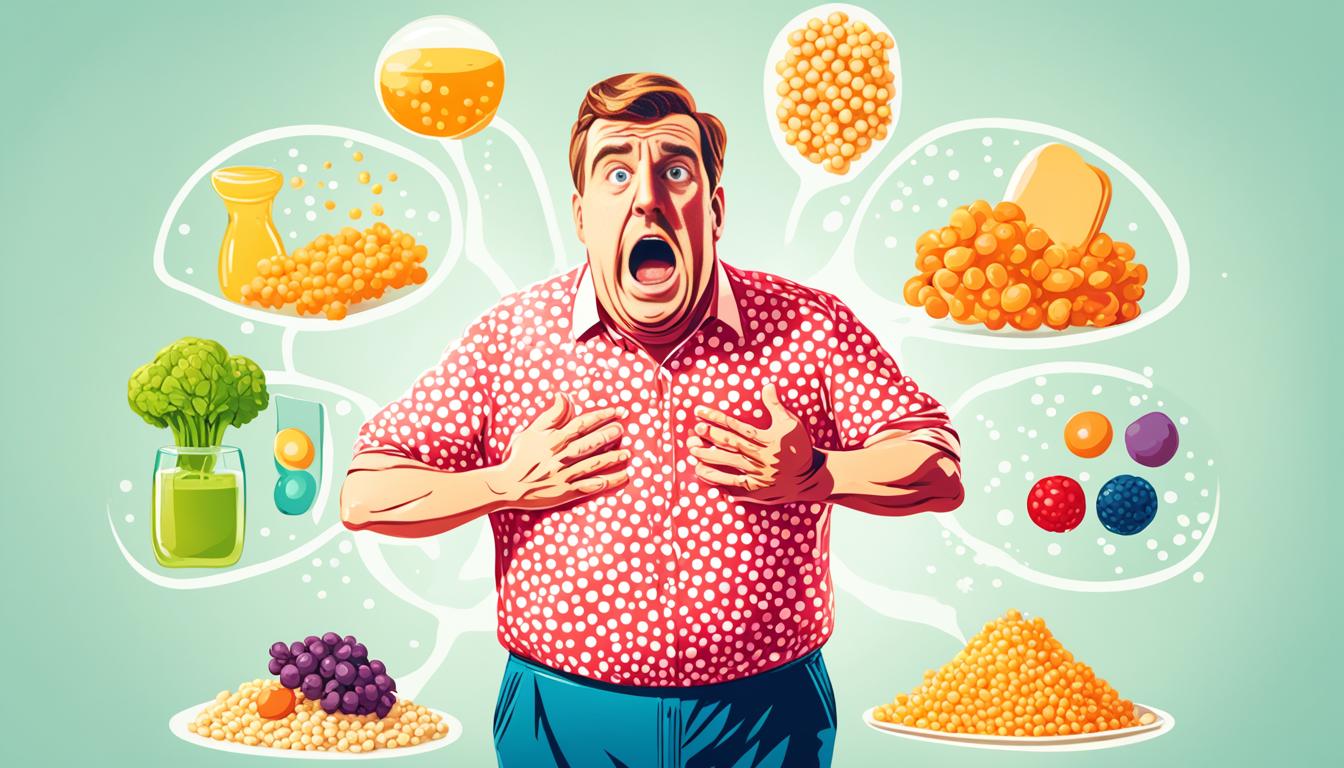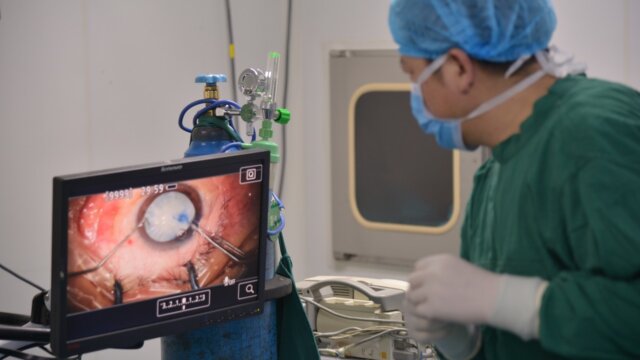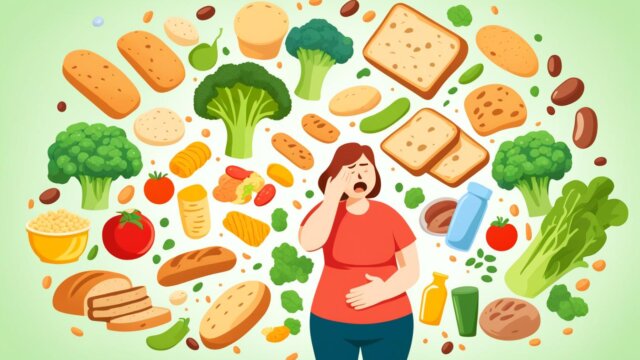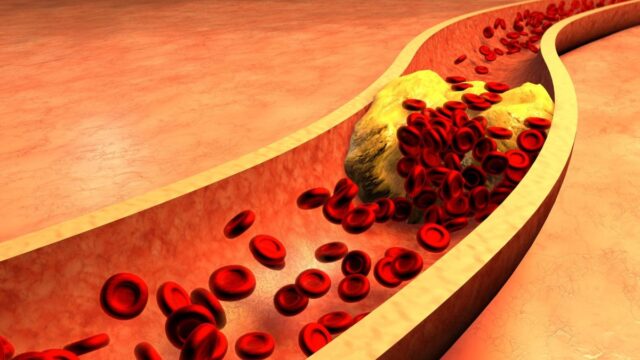FTC disclaimer: This post may contains affiliate links and we will be compensated if you click on a link and make a purchase.
Did you know the average person farts 13 to 21 times a day? Passing gas is normal, but too much can mean you have digestive issues. This guide will help you understand and fix your gas problems.
Key Takeaways
- Flatulence is common, happening about 20 times a day on average.
- Gas comes from swallowing air and bacteria in the large intestine.
- Certain foods and conditions like irritable bowel syndrome can cause more gas.
- Chronic belching and gas might mean you have digestive problems like GERD.
- Medicines and changing your lifestyle can help with gas symptoms.
What is Flatulence?
Flatulence is when gas comes out of our bodies through the anus. It’s also called passing gas or farting. This happens when gas builds up in our intestines. Most people fart between 13 and 21 times a day.
But, some health issues like irritable bowel syndrome (IBS), celiac disease, and gastroparesis can make you fart more.
Definition and Overview
Flatulence is when gas comes out of our digestive system through the anus. This gas comes from breaking down food and the work of bacteria in our intestines. It’s a normal thing that everyone does.
Frequency and Prevalence
Studies say most people fart between 13 to 21 times a day. Women might fart more often, but they’re usually quieter about it. Eating foods that are hard to digest or having certain health issues can make you fart more.
Everyone farts to some extent. Knowing about flatulence can help us deal with any issues we might have with it.
Causes of Flatulence
Flatulence can come from many things, like swallowing air or health issues. Knowing what causes it helps in managing gas.
Swallowing Air
Swallowing air, or aerophagia, is a common cause of flatulence. It can happen when eating, drinking, chewing gum, or doing other activities. Some people swallow a lot of air, which can lead to a lot of gas and burping.
Things like eating too much, smoking, chewing gum, and loose dentures can make you swallow more air.
Dietary Factors
What you eat can also cause flatulence. Eating too much of certain foods or not digesting them well can lead to gas. Foods like beans, cabbage, broccoli, and dairy products can cause gas.
Some people can’t have dairy because they are lactose intolerant and get gas.
Underlying Health Conditions
Some health issues can also make you produce more gas. Conditions like celiac disease and irritable bowel syndrome can cause gas. Not being able to absorb nutrients or digest food well can also lead to gas.
It’s important to see a doctor to find out why you have too much gas.
Knowing why you have flatulence helps you manage it. It’s good to talk to a doctor for the right treatment.
Symptoms and Complications
Flatulence is when gas comes out of our digestive system. It can cause physical symptoms and affect how we feel and interact with others. Knowing about these symptoms is key to handling this common issue.
Physical Symptoms of Flatulence
Flatulence can make you feel abdominal pain, bloated, and need to pass gas often. People usually belch up to 30 times a day. Passing gas through the anus can happen 8 to 14 times a day, which is normal. Sometimes, swallowed air can move to the intestines, making more gas.
Chewing gum or sucking on hard candy can make you swallow more air, adding to the problem. Smoking and loose dentures can also bring in more air, leading to more flatulence.
Health issues like Irritable Bowel Syndrome (IBS) can make gas symptoms worse. Small intestinal bacterial overgrowth (SIBO) can cause more gas too. Other digestive problems, like celiac disease, constipation, and malabsorption, can also increase gas or gas-related symptoms.
Emotional and Social Impacts of Flatulence
Excessive flatulence can make you feel embarrassed or anxious in public. This can make you avoid certain activities and lower your quality of life. The fear of being embarrassed can add stress, making the problem worse.
“Chronic flatulence can be a source of significant distress and impact social interactions for many individuals.”
It’s important to understand the physical and emotional effects of flatulence. By finding ways to manage it, people can feel better and improve their lives.
Home Remedies for Flatulence
Dealing with flatulence can be frustrating and embarrassing. But, there are home remedies that can help. Recent research shows these natural ways can ease this common issue.
Dietary Adjustments
First, find and avoid foods that make you gassy. Keeping a food diary can help you see what foods trigger your symptoms. Try eating smaller, more frequent meals and choose foods that are easier to digest.
Lifestyle Changes
Some habits can make flatulence worse. Avoid chewing gum, smoking, and drinking through straws to swallow less air. Drinking plenty of water helps prevent constipation, which can cause more gas. Regular exercise can also help manage flatulence.
Natural Remedies
There are natural remedies that might help with flatulence too. . But remember, these should not replace medical advice. Always talk to a doctor if your symptoms don’t get better.
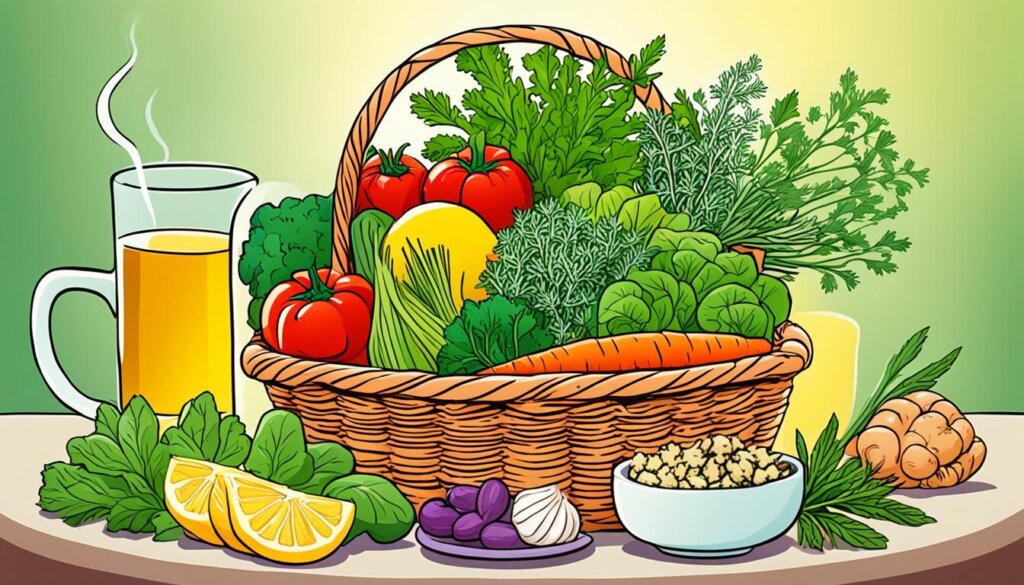
If you have ongoing or bad flatulence, see a healthcare professional. They can check for any health issues. By trying dietary changes, lifestyle adjustments, and natural remedies, you can manage your flatulence better and improve your digestion.
Treatment Options
If home remedies and lifestyle changes don’t work, there are more ways to help. You can try over-the-counter meds like antacids with simethicone (Gas-X, Phazyme) to ease gas. If needed, your doctor might suggest prescription drugs for conditions like IBS or SIBO.
Over-the-Counter Medications
For flatulence, over-the-counter meds can be a good start. Simethicone-based products break up gas bubbles to help them pass. They can quickly ease gas and bloating.
Prescription Drugs
Sometimes, you might need prescription meds for ongoing gas issues. Doctors might suggest these for IBS or SIBO to reduce gas. These treatments aim to fix the root cause for lasting relief.
Supplements and Enzymes
Supplements and enzymes can also help with gas. Lactase enzymes and alpha-galactosidase (Beano) help break down foods that cause gas. Always talk to a doctor before trying supplements to make sure they’re right for you.
Treatment Option | Description | Examples |
|---|---|---|
Over-the-Counter Medications | Break up gas bubbles to facilitate release | Gas-X, Phazyme |
Prescription Drugs | Target underlying conditions contributing to excessive gas | IBS or SIBO medications |
Supplements and Enzymes | Help the body break down gas-producing foods | Lactase, alpha-galactosidase (Beano) |
It’s important to work with your healthcare provider to find the best treatment for you. A doctor can help you manage your flatulence safely and effectively.
“Persistent and painful gas, especially when associated with vomiting, diarrhea, constipation, weight loss, or blood in the stool, should prompt consultation with a doctor as it may indicate a serious medical issue.”
Knowing about treatment options can help you manage your flatulence and boost your digestive health. Trying different meds, prescription drugs, and supplements can ease the discomfort of too much gas.
Diagnosing Excessive Flatulence
If you often have too much gas, see a doctor. They will ask about your eating habits, medicines, and health history. They might also check your belly for swelling or tenderness.
They might do tests like X-rays, blood tests, or stool tests to find the cause. Keeping a food diary can help them figure out why you have so much gas.
- Swallowing too much air can happen if you suck on candies or chew gum.
- Drinking things like soda or beer can make you burp more.
- Bad dentures or a lot of postnasal drips can also make you swallow more air.
Many things can cause too much gas, like what you eat, your health, and your habits. Working with your doctor and tracking your symptoms can help find the cause.

If you keep having too much gas and it’s worrying, see a doctor right away. They can do tests and find the right treatment to help you.
When to See a Doctor
Occasional flatulence is normal and part of a healthy digestive process. But, some signs and symptoms mean you should see a doctor. If you have unexplained, persistent, or severe flatulence, you should go to the doctor. This could mean you have a health issue that needs help.
Seeing a doctor is also a good idea if your flatulence is causing you a lot of discomfort. Or if it’s affecting your daily life or making you feel embarrassed in public. They can figure out what’s causing it and help you feel better.
If your flatulence comes with other symptoms like severe abdominal pain, bloody stools, persistent diarrhea or constipation, unintended weight loss, or signs of malabsorption, see a doctor fast. These could be signs of serious health problems like Irritable Bowel Syndrome (IBS), Inflammatory Bowel Disease (IBD), diverticulitis, or gastroparesis. You need to get medical help right away.
If you’re worried about your flatulence or digestive health, talk to your doctor. They can check you out, find the cause, and make a plan to help you feel better.
Flatulence and Underlying Conditions
Excessive or persistent flatulence can sometimes be a sign of an underlying medical condition. Conditions such as irritable bowel syndrome (IBS), Crohn’s disease, celiac disease, lactose intolerance, diabetes, and even certain cancers or ulcers can cause gas buildup and flatulence. If you have flatulence with other worrying symptoms, see a healthcare provider to find out why and get help.
Excessive belching or flatus, along with bloating, pain, or swelling of the belly, can sometimes make daily activities hard. Acid reflux or GERD can cause a lot of belching. Inflammation of the stomach lining or infection with Helicobacter pylori can also lead to belching. Gas in the intestines comes from undigested food being digested or fermented by bacteria. Poor absorption of carbohydrates can upset the balance of helpful bacteria, leading to gas.
Certain foods, like beans, peas, lentils, cabbage, onions, and broccoli, can cause gas. Some people are more sensitive to stomach symptoms and intestinal gas, which can make bloating worse.
If you have belly pain, bloody stools, chest discomfort, or unexplained weight loss with your flatulence, see a healthcare professional.
Underlying Condition | Relationship to Flatulence |
|---|---|
Irritable Bowel Syndrome (IBS) | IBS can contribute to excessive gas buildup and flatulence. |
Crohn’s Disease | Crohn’s disease can exacerbate flatulence. |
Celiac Disease | Individuals with celiac disease may experience increased flatulence when consuming gluten-containing foods. |
Lactose Intolerance | People with lactose intolerance can experience excessive flatulence when consuming lactose-containing products. |
Diabetes | Diabetes can contribute to excessive gas buildup and flatulence. |
Certain Cancers or Ulcers | Some types of cancers or ulcers can lead to flatulence as an underlying symptom. |
The average person passes gas 8-14 times a day. Diet, medications, and health conditions can make you pass more gas.
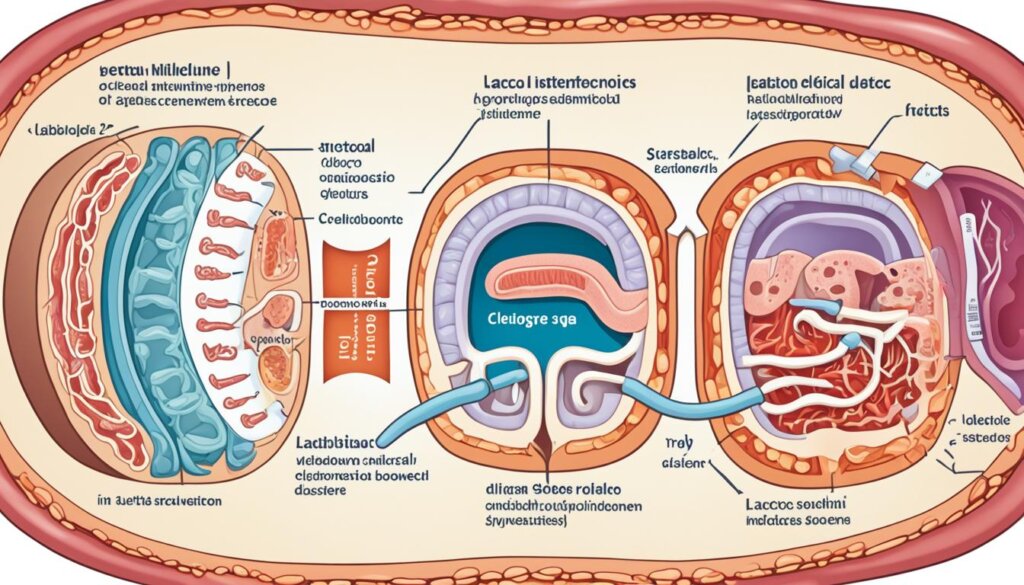
Preventing and Managing Flatulence
Excessive flatulence can be embarrassing and uncomfortable. But, there are ways to prevent and manage it. By changing your diet and lifestyle, you can feel better and improve your digestion.
Dietary Tips
To stop and manage flatulence, know which foods cause gas. Foods like dairy, beans, most fruits, and veggies are culprits. Eat smaller, more often to cut down on gas. Drinking lots of water also helps get rid of gas.
Lifestyle Modifications
Some habits increase flatulence. Avoid chewing gum, smoking, and drinking through straws to cut down on swallowed air. Regular exercise, like 150 minutes a week, helps with digestion and getting rid of gas.
Medicines likeBeano and probiotics can lessen flatulence and discomfort. Good posture and avoiding air swallowing also help.
If diet and lifestyle changes don’t help, see a doctor. They can find out if you have food intolerances or other issues causing your flatulence.
Using these tips, you can stop and manage flatulence. This will make you feel better and improve your life.
Flatulence and Digestive Health
Flatulence is a natural part of digestion. It’s important for our digestive health. But, too much gas might mean there’s a problem with your gut.
IBS, Crohn’s disease, and celiac disease can make you pass more gas. Eating foods high in fiber and using probiotics can help your gut work better and might cut down on gas.
Some foods like beans, cabbage, onions, and fruits can make you gassy because of their sugar or fiber. Carbs in whole-grain foods, dairy, and soft drinks can also cause gas in some people.
Conditions like Meganblase syndrome and gas-bloat syndrome can cause ongoing gas and discomfort. These might need special treatment and tests like colonoscopies to find the cause.
Knowing how flatulence affects your digestive health helps you manage gas better. You might need to change your diet, use certain medicines, or avoid swallowing too much air. Fixing the cause of too much gas can help you feel better and improve your digestion.
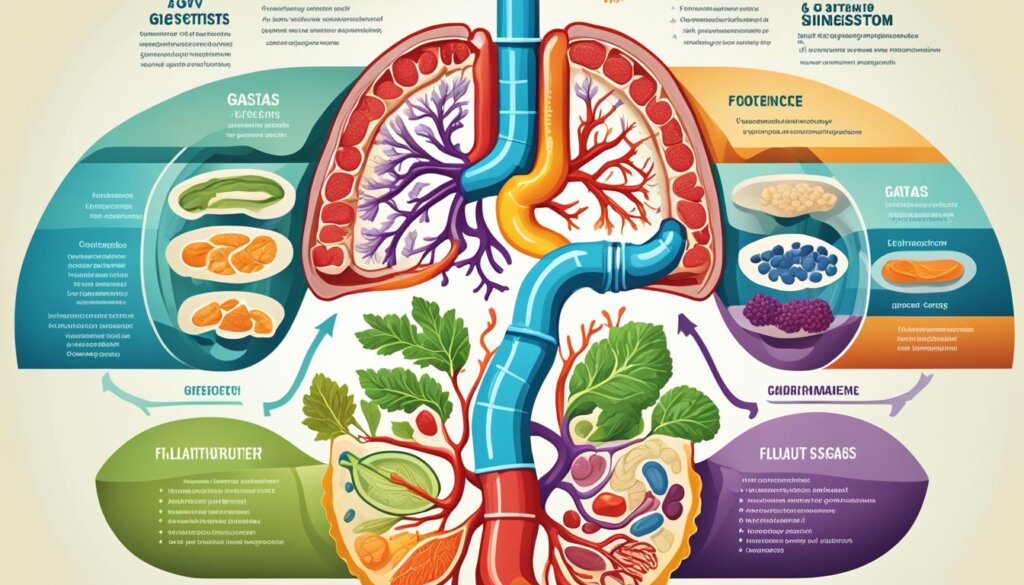
“Maintaining a healthy gut and managing gas can be key to overall digestive well-being.”
Flatulence in Social Situations
Dealing with flatulence in social situations can be tough and embarrassing. But remember, passing gas is a natural thing we all do. It’s normal to fart between 14 and 23 times a day. If you fart more than 23 times a day, it might be a sign of a health issue.
In social settings, being discreet and polite is key. If you need to pass gas, excuse yourself quietly and step away. Holding it in can cause pain, bloating, and constipation. Instead, breathe deeply and stay calm. This helps avoid making things more awkward.
To avoid embarrassing gas in social situations, try these tips:
- Avoid foods that make gas, like those with lots of prebiotics and fiber.
- Use relaxation techniques, like deep breathing or meditation, to release gas quietly.
- Carry over-the-counter meds or supplements for flatulence, like alpha-galactosidase or simethicone.
Most people get that flatulence is part of life. Being discreet and focusing on your comfort helps you handle these situations better. This way, you can enjoy being with others without worry.
Managing flatulence in social situations means being mindful, polite, and proactive. By using these tips, you can relax and enjoy being with others.
Conclusion
Flatulence, or passing gas, is normal and common. Sometimes, it’s okay to pass gas. But if it happens a lot, it might mean there’s a health issue. Knowing what causes it helps you manage it better through changes in your life, home remedies, and seeing a doctor if needed.
By eating well, drinking enough water, and seeing a doctor if it’s a big problem, you can feel better. This can make your digestion and life better overall.
This article talked about how common flatulence is, what causes it, and how it can affect you. It helps readers take steps to deal with it. This can make your digestion and life better.
This article gives clear info and tips on flatulence. It covers its causes, signs, and how to manage it. It helps with both occasional and ongoing gas issues. This makes it a useful guide for anyone dealing with digestive health.
FAQ
What is flatulence?
Flatulence is when gas comes out of the body through the anus. It happens when gas builds up in the intestines. It’s a normal part of being alive.
How often do most people experience flatulence?
Most folks pass gas between 13 and 21 times a day, on average.
What are the common causes of flatulence?
Eating certain foods high in carbs, swallowing air, and health issues like IBS, celiac disease, and diabetes cause flatulence.
What are the physical symptoms of flatulence?
Symptoms include belly pain, bloating, and passing gas. The smell can be bad too.
How can flatulence impact emotional and social aspects of life?
Too much flatulence can make people feel embarrassed or anxious in public. It can also make daily life harder and lead to avoiding social events.
What are some home remedies for managing flatulence?
To manage flatulence, try eating less gas-producing foods and avoid swallowing air. Natural remedies like probiotics, ginger, and charcoal pads can also help.
What are the treatment options for flatulence?
Treatments include over-the-counter meds like antacids, prescription drugs, and supplements like lactase enzymes and alpha-galactosidase (Beano).
When should someone see a doctor for flatulence?
See a doctor if you have unexplained, ongoing, or severe gas with belly pain, a swollen belly, or other symptoms like vomiting, diarrhea, or blood in your stool.
How can underlying medical conditions contribute to excessive flatulence?
Conditions like IBS, Crohn’s disease, and lactose intolerance can cause a lot of gas and flatulence.
What strategies can help prevent and manage flatulence?
To prevent and manage flatulence, eat foods that don’t cause gas, eat smaller meals, and drink plenty of water. Avoid swallowing air and exercise regularly to help reduce gas.
